|
|
|
Sort Order |
|
|
|
Items / Page
|
|
|
|
|
|
|
| Srl | Item |
| 1 |
ID:
129687
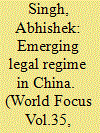

|
|
|
|
|
| Publication |
2014.
|
| Summary/Abstract |
The Chinese Communist Party (CPP), which was established in 1929, successfully unified mainland China in 1949 and founded a new nation Peoples Republic of China (PRC). In the next three decades, the communist government tried to safeguard and built the nation in principle with Communist-Maoist ideology both economically and politically. During this period, the function of law and the legal system was to serve as an instrument for the ruling communist government at large. As a result, the scope for proper legal regime in China suffered significantly from the chaos and disorder caused by endless class struggle.
|
|
|
|
|
|
|
|
|
|
|
|
|
|
|
|
| 2 |
ID:
086652
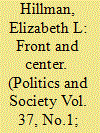

|
|
|
|
|
| Summary/Abstract |
Military-on-military sexual violence-the type of sexual violence that most directly disrupts operations, harms personnel, and undermines recruiting-occurs with astonishing frequency. The U.S. military has responded with a campaign to prevent and punish military-on-military sex crimes. This campaign, however, has made little progress, partly because of U.S. military law, a special realm of criminal justice dominated by legal precedents involving sexual violence and racialized images. By promulgating images and narratives of sexual exploitation, violent sexuality, and female subordination, the military justice system has helped to sustain a legal culture that reifies the connection between sexual violence and authentic soldiering.
|
|
|
|
|
|
|
|
|
|
|
|
|
|
|
|
| 3 |
ID:
086565
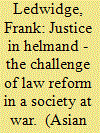

|
|
|
|
|
| Publication |
2009.
|
| Summary/Abstract |
The author describes the shortcomings of the justice system in Helmand province and the problems of running an effective Western-style system when civil authority is strongly contested. Traditional methods of dispute resolution are examined, together with the approach followed by the Taleban. His conclusion is pessimistic. A choice has to be made between accepting an effective traditional system and supporting a system familiar to the West which has little local traction.
|
|
|
|
|
|
|
|
|
|
|
|
|
|
|
|
| 4 |
ID:
114764
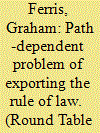

|
|
|
|
|
| Publication |
2012.
|
| Summary/Abstract |
This article examines three indicators of a functioning rule of law state. First, that the executive operates through legally constituted channels: that administrative and political actions are constrained and channelled through legal authority. Second, that trial processes are robust: being genuine attempts to decide according to proof and law, rather than returning decisions that it is hoped will placate the powerful. Third, that no individual entities, be they corporations or individuals, be they economically or politically or militarily powerful, are able to act outside the reach of legal remedy. The work of D. C. North helps in understanding how the failure to implement or reform law successfully is predictable if the relevant features of the society that receives legal transplant or legal reform efforts are ignored. Ultimately, reform must involve domestic agents in its design and implementation because their knowledge of the subjunctive worlds of their own societies is a vital component in the reform process.
|
|
|
|
|
|
|
|
|
|
|
|
|
|
|
|
| 5 |
ID:
097150
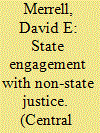

|
|
|
|
|
| Publication |
2010.
|
| Summary/Abstract |
Currently there is a question of whether and how Afghanistan should engage non-state councils of elders to resolve disputes. In order to harness their benefits (e.g. efficiency), control their abuses (e.g. occasional controversial resolutions), and stabilize the resolution of disputes, some have argued that formal links should be established between the state judicial system and non-state councils of elders in Afghanistan. Others argue that mere informal links between the two systems should be established. Still others suggest that prior models of state engagement in Afghanistan should be revived. In Kyrgyzstan, just 65 miles north of Afghanistan, the Tsarist, Soviet and post-Soviet administrations have used various methods to engage non-state councils of elders. Despite these vastly different attempts at controlling local dispute resolutions, elders independently resolved disputes outside of Tsarist and Soviet control and continue to resolve disputes outside of post-Soviet state control in Kyrgyzstan. This phenomenon highlights the need for legitimacy in any models of state engagement that are considered for Afghanistan. If, as observed in Kyrgyzstan, people do not use state-sanctioned local councils in Afghanistan, then their purposes may be frustrated. Therefore, in addition to reviewing the experience with state engagement in other parts of the world, policy makers in Afghanistan should also review the historical and contemporary experience with state engagement in Kyrgyzstan. As the need for legitimacy is reconsidered and applied to the design of models for Afghanistan, it may be more likely that those models will be used by more people in Afghanistan and that their purposes will be furthered.
|
|
|
|
|
|
|
|
|
|
|
|
|
|
|
|
|
|
|
|
|